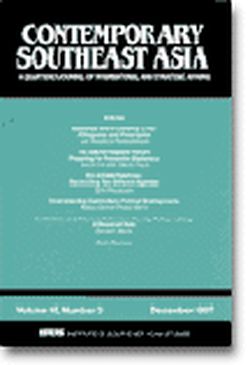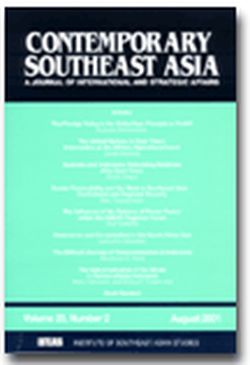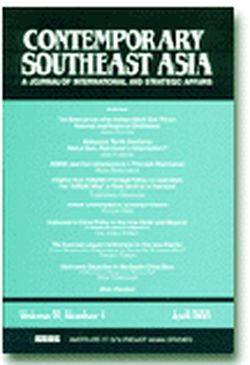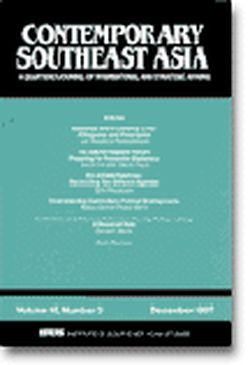Contemporary Southeast Asia: A Journal of International and Strategic Affairs Vol. 18/3 (Dec 1996)
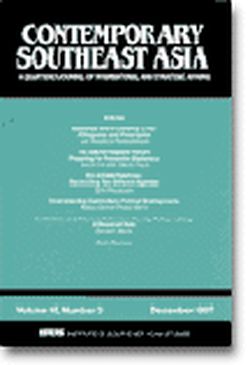
Date of publication:
December 1996
Number of pages:
109
Code:
CS18/3
Contents
-
Preliminary pages
- ARTICLES
-
Re-engineering ASEAN, by M C Abad, Jr, author see abstractThis article discusses ASEAN's recent decisions and activities which prove that the Association remains valuable to its member-states. Borrowing the concept of change management, the article analyses how far ASEAN has "re-engineered" itself in terms of policy outlook and organizational changes. ASEAN's renewal of its outward-looking perspective manifested through its active participation in the ASEAN Regional Forum (ARF) and the Asia-Pacific Economic Cooperation (APEC) forum, as well as its initiative to convene an Asia-Europe Meeting (ASEM), serves to regain or sustain its momentum and dynamism. Based on ASEAN's recent performance, the article suggests that ASEAN has embarked on a calculated re-engineering needed to maintain its relevance and secure its gains in the political, security and economic spheres.
-
The 1995 ASEAN Summit: Scaling a Higher Peak, by Simon J Hay, author see abstractThis article looks at the major outcomes of the 1995 ASEAN Summit. Notable for the first ever meeting of all ten Southeast Asian leaders, the catchcry of the Summit was "broadening and deepening" political, economic and social co-operation among existing and prospective members of ASEAN. The formation of ASEAN-Ten was the dream of the Association's founding fathers, as well as a pragmatic response to economic and geostrategic uncertainty. Although the impending inclusion of Cambodia, Laos and Myanmar into ASEAN may have captured the lime-light at the Summit, leaders took a number of significant decisions, not only to ensure that ASEAN remained relevant to its members, but also to increase the stature and influence of the grouping in the wider Asia-Pacific region.
-
Indonesian Defence Strategy and Security: Time for a Rethink?, by Alan Dupont, author see abstractThis article argues that Indonesia's defence strategy needs to be reconfigured, conceptually and operationally, to take account of emerging external security challenges which will increasingly shape Indonesia's national security agenda in the twenty-first century. The Indonesian Armed Forces (ABRI) currently suffers from a number of serious systemic and operational weaknesses and must find a more equitable balance between the very different demands of internal and external security. The focus of Indonesia's defence strategy will inevitably shift, over time, from territorial defence to maritime protection. However, this reality is yet to be reflected in Indonesia's force structure or defence doctrine. ABRI is currently saddled with an operational policy it cannot declare and a declaratory policy which has limited operational utility.
-
Human Rights and Democracy in Indonesia and Malaysia: Emerging Contexts and Discourse, by Philip Eldridge, author see abstractDespite some convergence, differences are evident between state and non-state perspectives in Indonesia and Malaysia. Both governments perceive threats to national stability and social harmony from too rapid political liberalization. Counter-discourse in Indonesia can be divided into twobroad streams. The first seeks to fuse liberal-democratic institutions with more open versions of Pancasila ideology; the second to link socio-economic with political transformation. Official responses combine repression with absorption of liberal democratic concepts into "integralist" versions of Pancasila. Reform efforts in Malaysia centre on applying consistent ``rule of law" principles to established ``Westminster"-type democratic institutions. However, the non-state sector enjoys relatively limited space, while various internationally-oriented and Islamic agendas diffuse energies for domestic reform.
-
Constructing the Vietnam War: A Review Article, by Greg Lockhart, author see abstractFollowing Ho Chi Minh: Memoirs of a North Vietnamese Colonel, by Bui Tin; In Retrospect: The Tragedy and Lessons of Vietnam by Robert S. McNamara with Brian Van De Mark; The Bunker Papers: Reports to the President from Vietnam, 1967-1973, Edited by Douglas Pike.
- BOOK REVIEWS
-
BOOK REVIEW: Democracy and Development in Southeast Asia by Clark D Neher and Ross Marlay., by Kenneth Christie, author
-
BOOK REVIEW: Secret Army, Secret War by Sedgwick Tourison, by Nick J Freeman, author
-
BOOK REVIEW: An Emerging China in a World of Interdependence by Yoichi Funabashi, Michel Oksenberg, and Heinrich Weiss, by Sheng Lijun, author

